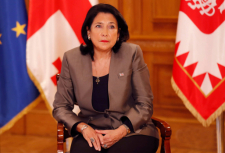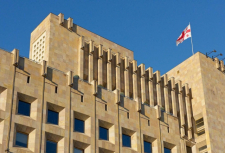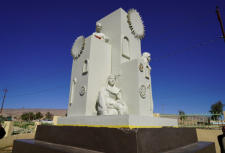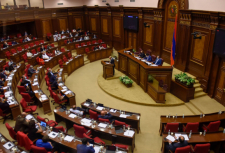On the consequences of the Yazidi genocide in the framework of the international investigation conducted by UNITAD under the UN security council
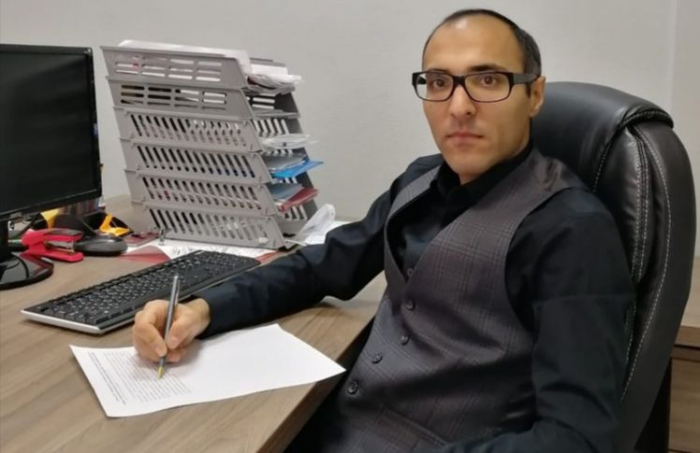
Abasyan Ferik Ordikhanovich
Lawyer, expert
On September 21, 2017, the UN Security Council at its 8052nd meeting, by resolution No. S/RES/2379 (2017), decided to establish a UN Investigative Group to promote accountability for crimes committed by Daesh/The "Islamic State of Iraq and the Levant", led by a Special Adviser (UNITAD) to support national (international) efforts aimed at holding ISIL members accountable for crimes committed in Iraq by collecting and preserving evidence that may amount to war crimes, crimes against humanity and genocide.
The criminal acts of ISIS, qualified as war crimes, crimes against humanity or genocide, as well as systematic work with victims, in accordance with the relevant acts of national legislation, are the main task of UNITAD.
As stated in the speech of UNITAD Special Adviser Karim Asad Ahmad Khan: "I can confirm to the Council that during the independent criminal investigation UNITAD has collected clear and convincing evidence that ISIS members committed genocide against the Yezidis".
The territory of the Middle East is the cradle of civilizations and monotheistic religions of such non-Semitic peoples as Yezidis, Yarsanists, Zoroastrians, Manichaeans, Jews, Christians of different faiths and Muslims, the arena of bloodshed and violence, the center of mass killings and the greatest tolerance with its dramatic events reflecting the extreme sensitivity of this part of the planet.
The question of who the Yezidis are - an ethnic or religious group, causes continuous disputes among scientists and historians. Today there is not a single fundamental scientific work on the history of the region in which this people is mentioned in the open access. Therefore, for most, the question of the origin of the Yezidis remains a mystery, but not for the Yezidis themselves. In the doctrine, the Yezidis are considered an ethno-confessional group of Kurds, but this is far from the case. Along with this, it should be recognized that in recent years, more and more Yazidis, distancing themselves from other peoples of the region, consider themselves a separate people. Unlike the Kurds, Turks, and Arabs, the Yezidis do not profess Islam, and their religion is considered one of the oldest monotheistic in the world.
Historical facts determine the ancestral homeland of the Yezidis, the territory of an ancient civilization in the Middle East – Mesopotamia. Here – in the interfluve of the Tigris and Euphrates River valleys, according to some facts, where the Sumerians lived almost seven thousand years ago, who made a significant contribution to the development of the entire human civilization. Studies prove that it is the Sumerians who are the ancestors of the Yezidis, and the word "Sumerian" itself was introduced into scientific circulation in order to designate the ancient non-Semitic population of Mesopotamia, since this entire territory was inhabited by different peoples, including the Yezidis. Scientific research has proved the genetic proximity of the Yezidis to the genomes of the ancient peoples of Mesopotamia.
Yezidis (self-designation "ezdi") are followers of monotheism. They call their religion "sharfadin", which, according to them, is older than Zoroastrianism and therefore has nothing to do with it. The Yezidis call their language "Ezdiki", it almost does not differ from the Kurdmanji language (which, according to many scientists, belongs to one of the dialects of the Kurdish language).
Be that as it may, for the radical Islamists of ISIS, the Yezidi people are "pagans", "sun worshippers", "followers of the devil", or "infidels" who should be killed or converted only to the Islamic religion. According to radical members of ISIS, if you kill a representative of the Yazidi people, they will automatically fall into "some kind of paradise." It is because of faith that the Yezidis have been destroyed spiritually and physically for centuries. Millions of them were converted to Islam or were exterminated because they refused to betray their faith, custom, language, culture.
The whole history of the Yezidis is truly unique, this people originate from the appearance of primitive people. Its uniqueness lies in the tolerant and peaceful nature of its relations to the outside world. It is not for nothing that modern researchers relate the Yezidis to prehistoric peoples who survived ethnocide, genocide, enslavement from the outside, unbearable inhuman hell, but due to their archaic faith and language, the Yezidis are preserved today as an autochthonous people.
Mass crimes since 2014 against the Yezidis have mainly focused on murder, slavery and sexual exploitation, which are now recognized as genocide by the international community and foreign States.
Recall that the number of Yezidis in Iraq is, according to various estimates, about 800,000 people. They live mainly in the Sinjar district (in Yezidi - Shangal), as well as in the settlements of Bashiqa and Bahzan, which are part of the Ninawa governorate, located in northwestern Iraq, near the border of Syria and Turkey, as well as in the Sheikhan district (Dohuk governorate), where there is a Yezidi shrine - a place of pilgrimage for all Yezidis of the world – the Lalesh temple.
According to statistics conducted by international non-governmental organizations jointly with UNITAD on the Yezidis: only 1,298 people were killed on the first day of the attack on the city of Sinjar in August 2014, 6,500 were abducted (of which women and girls were sold into sexual slavery), 68 cultural sites of religious minorities were destroyed, 115,000 people migrated outside Iraq, and 2,950 Yezidis are still missing. These figures are not final, as statistics are gradually updated.
The Constitution of Iraq in Article 2 proclaims Islam as the official religion of the State and the main source of legislation. However, Part 2 guarantees the Islamic identity of most of the Iraqi people, the fullness of everyone's religious rights, freedom of religion and worship, in particular the cult of Christians, Yezidis and Sabean-Mandeans (Part 2). The same principles are declared in the "Draft Constitution of Iraqi Kurdistan" of 2009 (Article 6). The Basic Law of Iraq thus lays the foundation for the direct influence of Islam on the current legislation, however, immediately stipulating that no law can also contradict the principles of democracy (without specifying these principles), as well as the rights and fundamental freedoms proclaimed in the Constitution.
In fact, despite constitutional guarantees, the Yazidis, compared to other communities, are the most vulnerable minority in Iraq. They have neither international support (unlike Christians, who are protected by Western states, or Turkmens, who are protected by Turkey), nor territories for refuge (unlike Muslim Kurds or Shiite Arabs). We believe that this circumstance was also considered by the leaders of the IG when they began the campaign of massacre of the Yezidis. In this regard, it is necessary to pay attention to the fact that of all the hundreds and thousands of terrorist attacks committed in Iraq over the past decade, the terrorist attack against the Yezidis turned out to be the largest.
The separation of power in Iraq and Iraqi Kurdistan after the fall of the Iraqi totalitarian regime in 2003 led to a decrease in the representation of Yezidis both in the political life of the country and in administrative and administrative bodies. The Yezidis were treated differently from other citizens of the country.
As for the federal authorities of Iraq, the rights of the Yezidis were rejected on the grounds that the Yezidis have a common identity with the Kurds, and in Iraqi Kurdistan, the Yezidis were treated based on their religious affiliation as "second-class citizens", they were not granted any rights on claims to ethnicity, the Yezidis were deprived of many socio-political rights, inter-budgetary transfers and treated them as "citizens on demand".
It should be noted that the analyzed report was prepared by the UN Investigative Group on Assistance in Bringing to Justice for Crimes Committed by Daesh/ISIL (UNITAD).
The UNITAD report provides a detailed analysis regarding the destruction of the tangible and intangible cultural heritage of the Yezidis as an important aspect of the policy of ISIL members on ethnic cleansing and genocide. Evidence of destruction has been collected and continues to be collected so that these acts do not remain unrecognized and unpunished by the international community.
During UNITAD's investigative work in Iraq, the process proceeded along two main priorities – the investigation of the attack on the Yezidis in the Sinjar area and the mass murder of unarmed servicemen (cadets) The Air Force Academy in the city of Tikrit in 2014. The result was a detailed analysis of the legal qualification of crimes, which helps to strengthen the basis on which national agencies can begin criminal prosecution of ISIL members. Investigative work is currently continuing, including in Baghdad, Dahuk and Erbil.
Investigations of the attacks revealed that the Yazidis were the main target as such victims, mass killings took place in Kocho, Solakh, the southern and northern parts of Sinjar, Khan Sur, Hardan and Sinuni and their surroundings.
The UNITAD report is extremely important both for understanding the events unfolding in the enclave inhabited by Yezidis and Christians, and for discussing and developing measures to preserve the religious and ethnic diversity of the Iraqi region. First, assessing the importance of the report, it is necessary to highlight the following:
Firstly, UNITAD continues its work in Iraq together with investigators, forensic experts, psychosocial support specialists, legal specialists, digital forensics experts and witness protection specialists;
Secondly, UNITAD's specialized thematic units on sexual and gender-based crimes and crimes against children, financial tracking and witness protection and support, provide targeted support during all investigative activities;
Thirdly, operational units in Baghdad, Dahuk, Erbil and New York, allowing UNITAD to effectively interact with the local population, quickly respond to evidence collection opportunities and effectively cooperate with UN structures and Member States;
Fourth, the formation of a dossier on ISIS crimes, which may constitute war crimes, crimes against humanity and genocide;
Fifth, excavations at mass graves of Yezidis and other representatives of the religious minority.
UNITAD, together with representatives of Iraq, continue to discuss a legislative act laying the legal basis for the prosecution of ISIL members in Iraq for war crimes, crimes against humanity and genocide. The UNITAD Special Adviser is actively working with key national partners to support such an initiative. Efforts are being made in Iraq to establish this legal framework for the prosecution of ISIL members for crimes falling under the UNITAD mandate, but the national authorities of other Member States have also demonstrated an increasing willingness and ability to consider ISIL crimes through the prism of international criminal law.
The normative act creates a legal imperative for the criminal prosecution of terrorists for international crimes and officially recognizes the gravity of crimes committed against Yezidis, Turkmens, Christians and Shabaks, embodies a positive concept of the administration of justice in Iraq. But the measures taken are not yet sufficient, it requires the inclusion of additional investigative forces, to speed up the whole process.
Thus, investigations and criminal prosecution are currently being carried out in a number of European and North American judicial authorities, and the national authorities of many States apply a cumulative approach, in which alleged members of ISIS are charged with committing both terrorist crimes and international crimes. Within the framework of these proceedings, criminal prosecution of persons was carried out, including for genocide, enslavement, looting and recruitment of Yazidi child soldiers. In 2021, cases related to the acquisition and death of two Yezidis enslaved by ISIS began to be considered in Germany. German citizen Jennifer Wenisch was convicted of war crimes and complicity in crimes against humanity and sentenced to 10 years in prison, and Iraqi Tahu al-Jumaili was sentenced to life imprisonment on charges of genocide of Yezidis. Two ongoing trials envisage the use of universal jurisdiction to prosecute the crime of genocide in accordance with international crimes legislation.
It is obvious that the UN member States, and first the member States of the UN Security Council, must take responsibility for the ongoing genocide of the Yezidis.
It seems that the report of UNITAD at the UN puts all the dots over the "and", namely: the object of the genocide of ISIS members are only representatives of the minority - Yezidis, Yarsanists, Zoroastrians, Christians of different faiths. We hope that in the light of this conclusion, following the Human Rights Office of the UN Assistance Mission for Iraq, the Office of the UN High Commissioner for Human Rights, UNITAD at the UN Security Council, the League of Arab States, the European Parliament, the Parliamentary Assembly of the Council of Europe, the United States, Great Britain, Belgium, the Netherlands, Armenia, Iraq, Turkey, Australia, Canada, other UN member States will also adjust their position and finally recognize the act of genocide against the Yezidis.
Believe need the following fundamental steps required participation of the international community (especially from the five permanent member States of the UN Security Council – China, Russia, USA, France and the UK):
1) the introduction of international peacekeepers in the territory of compact residence of Yazidis in Iraq Sinjar district of the Ninawa governorate, including the Russian, because of a brilliant military operation in Syria;
2) The UN and its Member States continue to ensure, on the basis of an international mechanism, the delivery and distribution of humanitarian aid to those in need, including food, shelter, medical supplies and logistical support;
3) the creation of cultural autonomy for the Yezidis in the Ninawa Governorate of Iraq.
They (the steps) will serve as a real guarantee in solving the Yezidi issue and preventing the re-commission of acts of genocide.
Tags: #yazidisinfo #aboutyazidis #humanrights #genocideyazidis #UN #UNITAD
On the consequences of the Yazidi genocide in the framework of the international investigation conducted by UNITAD under the UN security council

Abasyan Ferik Ordikhanovich
Lawyer, expert
On September 21, 2017, the UN Security Council at its 8052nd meeting, by resolution No. S/RES/2379 (2017), decided to establish a UN Investigative Group to promote accountability for crimes committed by Daesh/The "Islamic State of Iraq and the Levant", led by a Special Adviser (UNITAD) to support national (international) efforts aimed at holding ISIL members accountable for crimes committed in Iraq by collecting and preserving evidence that may amount to war crimes, crimes against humanity and genocide.
The criminal acts of ISIS, qualified as war crimes, crimes against humanity or genocide, as well as systematic work with victims, in accordance with the relevant acts of national legislation, are the main task of UNITAD.
As stated in the speech of UNITAD Special Adviser Karim Asad Ahmad Khan: "I can confirm to the Council that during the independent criminal investigation UNITAD has collected clear and convincing evidence that ISIS members committed genocide against the Yezidis".
The territory of the Middle East is the cradle of civilizations and monotheistic religions of such non-Semitic peoples as Yezidis, Yarsanists, Zoroastrians, Manichaeans, Jews, Christians of different faiths and Muslims, the arena of bloodshed and violence, the center of mass killings and the greatest tolerance with its dramatic events reflecting the extreme sensitivity of this part of the planet.
The question of who the Yezidis are - an ethnic or religious group, causes continuous disputes among scientists and historians. Today there is not a single fundamental scientific work on the history of the region in which this people is mentioned in the open access. Therefore, for most, the question of the origin of the Yezidis remains a mystery, but not for the Yezidis themselves. In the doctrine, the Yezidis are considered an ethno-confessional group of Kurds, but this is far from the case. Along with this, it should be recognized that in recent years, more and more Yazidis, distancing themselves from other peoples of the region, consider themselves a separate people. Unlike the Kurds, Turks, and Arabs, the Yezidis do not profess Islam, and their religion is considered one of the oldest monotheistic in the world.
Historical facts determine the ancestral homeland of the Yezidis, the territory of an ancient civilization in the Middle East – Mesopotamia. Here – in the interfluve of the Tigris and Euphrates River valleys, according to some facts, where the Sumerians lived almost seven thousand years ago, who made a significant contribution to the development of the entire human civilization. Studies prove that it is the Sumerians who are the ancestors of the Yezidis, and the word "Sumerian" itself was introduced into scientific circulation in order to designate the ancient non-Semitic population of Mesopotamia, since this entire territory was inhabited by different peoples, including the Yezidis. Scientific research has proved the genetic proximity of the Yezidis to the genomes of the ancient peoples of Mesopotamia.
Yezidis (self-designation "ezdi") are followers of monotheism. They call their religion "sharfadin", which, according to them, is older than Zoroastrianism and therefore has nothing to do with it. The Yezidis call their language "Ezdiki", it almost does not differ from the Kurdmanji language (which, according to many scientists, belongs to one of the dialects of the Kurdish language).
Be that as it may, for the radical Islamists of ISIS, the Yezidi people are "pagans", "sun worshippers", "followers of the devil", or "infidels" who should be killed or converted only to the Islamic religion. According to radical members of ISIS, if you kill a representative of the Yazidi people, they will automatically fall into "some kind of paradise." It is because of faith that the Yezidis have been destroyed spiritually and physically for centuries. Millions of them were converted to Islam or were exterminated because they refused to betray their faith, custom, language, culture.
The whole history of the Yezidis is truly unique, this people originate from the appearance of primitive people. Its uniqueness lies in the tolerant and peaceful nature of its relations to the outside world. It is not for nothing that modern researchers relate the Yezidis to prehistoric peoples who survived ethnocide, genocide, enslavement from the outside, unbearable inhuman hell, but due to their archaic faith and language, the Yezidis are preserved today as an autochthonous people.
Mass crimes since 2014 against the Yezidis have mainly focused on murder, slavery and sexual exploitation, which are now recognized as genocide by the international community and foreign States.
Recall that the number of Yezidis in Iraq is, according to various estimates, about 800,000 people. They live mainly in the Sinjar district (in Yezidi - Shangal), as well as in the settlements of Bashiqa and Bahzan, which are part of the Ninawa governorate, located in northwestern Iraq, near the border of Syria and Turkey, as well as in the Sheikhan district (Dohuk governorate), where there is a Yezidi shrine - a place of pilgrimage for all Yezidis of the world – the Lalesh temple.
According to statistics conducted by international non-governmental organizations jointly with UNITAD on the Yezidis: only 1,298 people were killed on the first day of the attack on the city of Sinjar in August 2014, 6,500 were abducted (of which women and girls were sold into sexual slavery), 68 cultural sites of religious minorities were destroyed, 115,000 people migrated outside Iraq, and 2,950 Yezidis are still missing. These figures are not final, as statistics are gradually updated.
The Constitution of Iraq in Article 2 proclaims Islam as the official religion of the State and the main source of legislation. However, Part 2 guarantees the Islamic identity of most of the Iraqi people, the fullness of everyone's religious rights, freedom of religion and worship, in particular the cult of Christians, Yezidis and Sabean-Mandeans (Part 2). The same principles are declared in the "Draft Constitution of Iraqi Kurdistan" of 2009 (Article 6). The Basic Law of Iraq thus lays the foundation for the direct influence of Islam on the current legislation, however, immediately stipulating that no law can also contradict the principles of democracy (without specifying these principles), as well as the rights and fundamental freedoms proclaimed in the Constitution.
In fact, despite constitutional guarantees, the Yazidis, compared to other communities, are the most vulnerable minority in Iraq. They have neither international support (unlike Christians, who are protected by Western states, or Turkmens, who are protected by Turkey), nor territories for refuge (unlike Muslim Kurds or Shiite Arabs). We believe that this circumstance was also considered by the leaders of the IG when they began the campaign of massacre of the Yezidis. In this regard, it is necessary to pay attention to the fact that of all the hundreds and thousands of terrorist attacks committed in Iraq over the past decade, the terrorist attack against the Yezidis turned out to be the largest.
The separation of power in Iraq and Iraqi Kurdistan after the fall of the Iraqi totalitarian regime in 2003 led to a decrease in the representation of Yezidis both in the political life of the country and in administrative and administrative bodies. The Yezidis were treated differently from other citizens of the country.
As for the federal authorities of Iraq, the rights of the Yezidis were rejected on the grounds that the Yezidis have a common identity with the Kurds, and in Iraqi Kurdistan, the Yezidis were treated based on their religious affiliation as "second-class citizens", they were not granted any rights on claims to ethnicity, the Yezidis were deprived of many socio-political rights, inter-budgetary transfers and treated them as "citizens on demand".
It should be noted that the analyzed report was prepared by the UN Investigative Group on Assistance in Bringing to Justice for Crimes Committed by Daesh/ISIL (UNITAD).
The UNITAD report provides a detailed analysis regarding the destruction of the tangible and intangible cultural heritage of the Yezidis as an important aspect of the policy of ISIL members on ethnic cleansing and genocide. Evidence of destruction has been collected and continues to be collected so that these acts do not remain unrecognized and unpunished by the international community.
During UNITAD's investigative work in Iraq, the process proceeded along two main priorities – the investigation of the attack on the Yezidis in the Sinjar area and the mass murder of unarmed servicemen (cadets) The Air Force Academy in the city of Tikrit in 2014. The result was a detailed analysis of the legal qualification of crimes, which helps to strengthen the basis on which national agencies can begin criminal prosecution of ISIL members. Investigative work is currently continuing, including in Baghdad, Dahuk and Erbil.
Investigations of the attacks revealed that the Yazidis were the main target as such victims, mass killings took place in Kocho, Solakh, the southern and northern parts of Sinjar, Khan Sur, Hardan and Sinuni and their surroundings.
The UNITAD report is extremely important both for understanding the events unfolding in the enclave inhabited by Yezidis and Christians, and for discussing and developing measures to preserve the religious and ethnic diversity of the Iraqi region. First, assessing the importance of the report, it is necessary to highlight the following:
Firstly, UNITAD continues its work in Iraq together with investigators, forensic experts, psychosocial support specialists, legal specialists, digital forensics experts and witness protection specialists;
Secondly, UNITAD's specialized thematic units on sexual and gender-based crimes and crimes against children, financial tracking and witness protection and support, provide targeted support during all investigative activities;
Thirdly, operational units in Baghdad, Dahuk, Erbil and New York, allowing UNITAD to effectively interact with the local population, quickly respond to evidence collection opportunities and effectively cooperate with UN structures and Member States;
Fourth, the formation of a dossier on ISIS crimes, which may constitute war crimes, crimes against humanity and genocide;
Fifth, excavations at mass graves of Yezidis and other representatives of the religious minority.
UNITAD, together with representatives of Iraq, continue to discuss a legislative act laying the legal basis for the prosecution of ISIL members in Iraq for war crimes, crimes against humanity and genocide. The UNITAD Special Adviser is actively working with key national partners to support such an initiative. Efforts are being made in Iraq to establish this legal framework for the prosecution of ISIL members for crimes falling under the UNITAD mandate, but the national authorities of other Member States have also demonstrated an increasing willingness and ability to consider ISIL crimes through the prism of international criminal law.
The normative act creates a legal imperative for the criminal prosecution of terrorists for international crimes and officially recognizes the gravity of crimes committed against Yezidis, Turkmens, Christians and Shabaks, embodies a positive concept of the administration of justice in Iraq. But the measures taken are not yet sufficient, it requires the inclusion of additional investigative forces, to speed up the whole process.
Thus, investigations and criminal prosecution are currently being carried out in a number of European and North American judicial authorities, and the national authorities of many States apply a cumulative approach, in which alleged members of ISIS are charged with committing both terrorist crimes and international crimes. Within the framework of these proceedings, criminal prosecution of persons was carried out, including for genocide, enslavement, looting and recruitment of Yazidi child soldiers. In 2021, cases related to the acquisition and death of two Yezidis enslaved by ISIS began to be considered in Germany. German citizen Jennifer Wenisch was convicted of war crimes and complicity in crimes against humanity and sentenced to 10 years in prison, and Iraqi Tahu al-Jumaili was sentenced to life imprisonment on charges of genocide of Yezidis. Two ongoing trials envisage the use of universal jurisdiction to prosecute the crime of genocide in accordance with international crimes legislation.
It is obvious that the UN member States, and first the member States of the UN Security Council, must take responsibility for the ongoing genocide of the Yezidis.
It seems that the report of UNITAD at the UN puts all the dots over the "and", namely: the object of the genocide of ISIS members are only representatives of the minority - Yezidis, Yarsanists, Zoroastrians, Christians of different faiths. We hope that in the light of this conclusion, following the Human Rights Office of the UN Assistance Mission for Iraq, the Office of the UN High Commissioner for Human Rights, UNITAD at the UN Security Council, the League of Arab States, the European Parliament, the Parliamentary Assembly of the Council of Europe, the United States, Great Britain, Belgium, the Netherlands, Armenia, Iraq, Turkey, Australia, Canada, other UN member States will also adjust their position and finally recognize the act of genocide against the Yezidis.
Believe need the following fundamental steps required participation of the international community (especially from the five permanent member States of the UN Security Council – China, Russia, USA, France and the UK):
1) the introduction of international peacekeepers in the territory of compact residence of Yazidis in Iraq Sinjar district of the Ninawa governorate, including the Russian, because of a brilliant military operation in Syria;
2) The UN and its Member States continue to ensure, on the basis of an international mechanism, the delivery and distribution of humanitarian aid to those in need, including food, shelter, medical supplies and logistical support;
3) the creation of cultural autonomy for the Yezidis in the Ninawa Governorate of Iraq.
They (the steps) will serve as a real guarantee in solving the Yezidi issue and preventing the re-commission of acts of genocide.
Tags: #yazidisinfo #aboutyazidis #humanrights #genocideyazidis #UN #UNITAD
